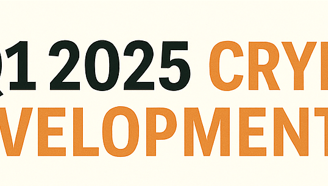DACC National News Roundup – April 2025
Q1 2025 brought major national developments for crypto—from the Federal Reserve calling for new regulations to the SEC’s initial ETF approvals. This blog post from DACC breaks down key headlines, including Illinois’ proposed Bitcoin reserve, renewed interest in crypto-backed loans, and rising political influence from pro-crypto groups. It’s a must-read summary for anyone tracking how regulation, politics, and financial innovation are shaping the future of digital assets.
Kevin Trommer, Deputy Director - DACC
5/2/20253 min read


The digital asset sector is moving fast, and the first quarter of 2025 has already brought major national developments. Below is a summary of recent news stories and how they could impact consumers, investors, and the broader cryptocurrency ecosystem.
Federal Reserve Chair Jerome Powell Calls for New Crypto Regulations
Federal Reserve Chair Jerome Powell reiterated his view that existing U.S. financial regulations are not fully equipped to handle the risks introduced by digital assets. He suggested that new rules should be developed specifically for the crypto sector, with a focus on stablecoins and systemic risk.
If Powell’s comments translate into action, consumers can expect tighter controls on the way digital assets are issued, held, and traded. A separate regulatory framework could bring more legitimacy to the industry but could also lead to increased compliance costs, fewer on-ramps for smaller players, and slower innovation.
Gemini Refuses to Hire MIT Graduates Over Gary Gensler’s Involvement
Crypto exchange Gemini announced it would no longer recruit graduates from MIT, citing SEC Chair Gary Gensler’s previous role as a professor there. The move is intended as a direct response to what Gemini calls Gensler’s overreach in targeting digital asset companies.
While the hiring decision is mostly symbolic, it highlights growing tensions between the crypto sector and federal regulators. Consumers should expect a hardening stance from companies against what they see as politically motivated enforcement actions. This conflict could further delay regulatory clarity and create instability in the market.
Global Financial Leaders Call for Cross-Border Crypto Collaboration
A group of international finance experts emphasized the urgent need for countries to coordinate their regulatory approaches to crypto. The article outlines how fragmented regulations create gaps that bad actors exploit, and calls for common standards across jurisdictions.
If international collaboration moves forward, it could benefit consumers by creating safer global markets with fewer loopholes. However, overly aggressive coordination could also standardize heavy-handed regulations that stifle competition and limit consumer choice.
Illinois Proposes a State-Run Bitcoin Strategic Reserve
Lawmakers in Illinois have introduced a bill to create a Bitcoin Strategic Reserve. If passed, the state would invest in Bitcoin as part of its broader financial strategy, treating it as a reserve asset similar to gold.
If Illinois moves forward, it could encourage other states to consider digital assets as legitimate financial reserves, which would help normalize Bitcoin in public finance. For consumers, this could boost confidence in Bitcoin’s long-term role, although risks tied to market volatility remain significant.
Renewed Interest in Bitcoin-Backed Loans
Financial institutions are showing renewed interest in Bitcoin-backed loans, with some traditional players considering entry into this market. The article discusses how past failures have made lenders cautious, but there is growing recognition of Bitcoin’s role as a valuable asset for collateral.
The return of Bitcoin-backed loans could expand financial options for consumers holding crypto, offering liquidity without requiring them to sell their holdings. However, it also increases risk exposure if Bitcoin prices drop sharply, and consumers will need to be cautious about leverage and loan terms.
Crypto Political Influence Grows Ahead of U.S. Midterms
The Fairshake PAC and other crypto-aligned groups are ramping up their political activity ahead of the U.S. midterms. Significant funds are being directed toward candidates viewed as supportive of digital asset innovation and skeptical of overregulation.
The increased political engagement by the crypto industry could lead to more favorable policies if pro-crypto candidates gain influence. For consumers, this could mean a better regulatory environment long-term. However, it also politicizes the industry further, which may make bipartisan solutions harder to achieve.
SEC Gives Initial Approval for Bitcoin and Ethereum ETF Applications
The SEC has given initial approval for Bitwise’s spot Bitcoin and Ethereum ETFs. While final approval is still pending, the move marks a significant milestone toward mainstream adoption of crypto-based financial products.
For consumers, ETFs backed by actual Bitcoin and Ethereum would provide easier, safer access to digital assets without the need to manage private keys or interact with exchanges directly. If finalized, it could also drive new demand and price stability across the sector.
Conclusion
The first quarter of 2025 shows that regulatory, political, and financial pressures on the digital asset sector are intensifying. Consumers should remain aware of these developments, as they will impact everything from investment opportunities to market access. DACC will continue tracking these national trends to keep our community informed and prepared for what lies ahead.
